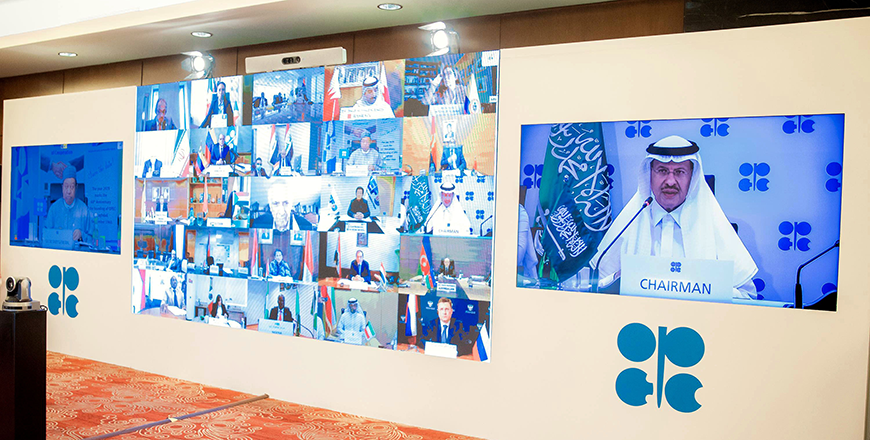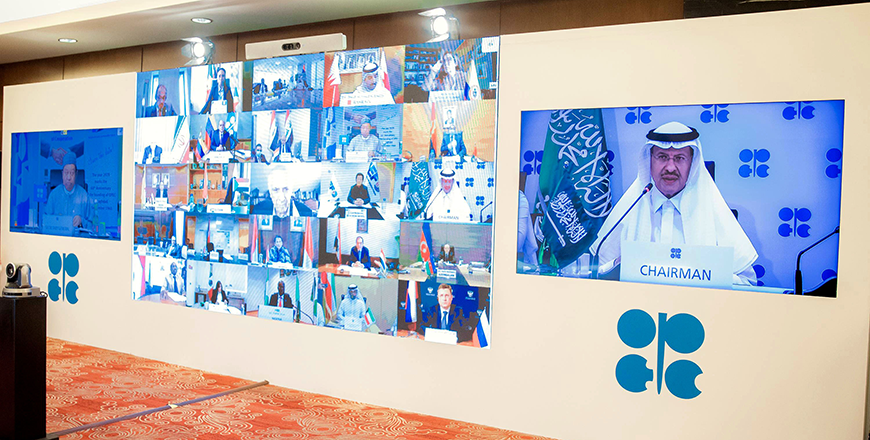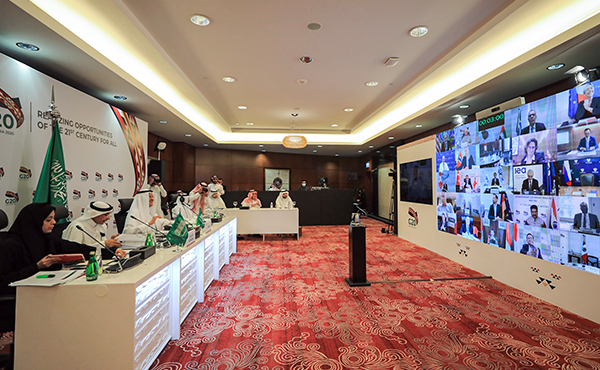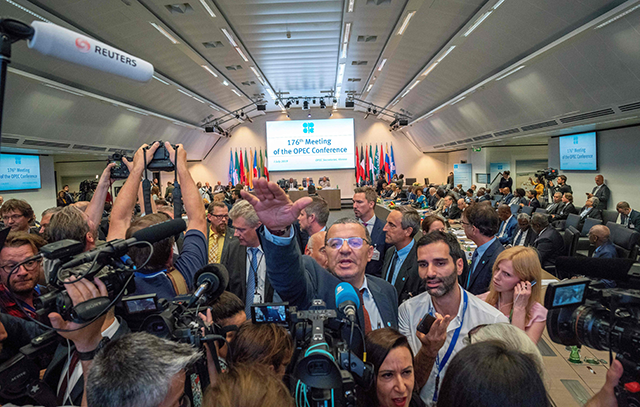You are here
Top oil producers agree on 'historic' cuts
By AFP - Apr 13,2020 - Last updated at Apr 13,2020

Saudi Energy Minister Prince Abdulaziz Bin Salman Al-Saud (right), chairing the virtual extraordinary meeting of OPEC and non-OPEC countries, on April 9, 2020, in Riyadh (AFP photo)
VIENNA — Top oil-producing countries agreed on Sunday on "historic" output cuts in a bid to boost plummeting oil prices.
OPEC producers dominated by Saudi Arabia and allies led by Russia met via videoconference for an hour on Sunday in a last effort to cement a deal struck early Friday.
It still required Mexico's agreement and in a compromise reached Sunday they agreed to a cut of 9.7 million barrels per day from May, according to its Energy Minister Rocio Nahle, down slightly from 10 million barrels per day envisioned earlier.
OPEC Secretary General Mohammad Barkindo called the cuts "historic".
"They are largest in volume and the longest in duration, as they are planned to last for two years," he said.
The agreement between the Vienna-based Organisation of the Petroleum Exporting Countries (OPEC) and partners foresees deep output cuts in May and June followed by a gradual reduction in cuts until April 2022.
Barkindo added that the deal "paved the way for a global alliance with the participation of the G-20".
Following extensive efforts "we announce completing the historical agreement", Kuwait Oil Minister Khaled Al-Fadhel tweeted.
Saudi Energy Minister Prince Abdulaziz Bin Salman, who chaired the meeting together with his Russian and Algerian counterparts, also confirmed that the discussions "ended with consensus".
'Great deal for all'
US President Donald Trump welcomed a "great deal for all", saying on Twitter it would "save hundreds of thousands of energy jobs in the United States".
He added he "would like to thank and congratulate" Russian President Vladimir Putin and Saudi Crown Prince and de facto leader Mohammed Bin Salman, both of whom he had spoken to.
In a statement, the Kremlin confirmed the joint phone call, adding that Putin and Trump agreed on the "great importance" of the deal.
Initial reticence from Mexico to introduce output cuts had led to a standoff that cast doubt on efforts to bolster oil prices, pushed to near two-decade lows.
Oil prices have slumped since the beginning of the year due to the COVID-19 pandemic that has sapped demand as countries around the world have put their populations under lockdown.
Compounding the problem, key players Russia and Saudi Arabia had engaged in a price war, ramping up output in a bid to hold on to market share and undercut US shale producers.
'Temporary relief'
Rystad Energy analyst Per Magnus Nysveen said Sunday's agreement provided "at least a temporary relief" as fuel consumption was expected to fall globally by 27 million barrels per day in April and 20 million barrels per day in May.
His colleague Bjornar Tonhaugen said that even though the deal made "the single largest output cut in history", prices were still expected to see "renewed downwards pressure".
"The oil market will see enormous stock builds in April as the deal is only in effect from 1 May, while gradual shut …and production declines will already happen during the current month," he said.
Top oil producers struggled to finalise production cuts during a virtual summit held by G-20 energy ministers on Friday, despite Trump's mediation efforts to end the standoff with Mexico.
Russian Energy Minister Alexander Novak was quoted by Russian news agency TASS as saying he did not expect oil markets to recover before "end of the year, in the best case".
Harry Tchilinguirian of BNP Paribas said "a sustained recovery" in the oil price was not expected "until pent-up demand is released in Q3 on the lifting of confinement and social distancing measures related to COVID-19".
Related Articles
RIYADH — G-20 energy ministers held virtual talks on Friday as major oil producers scrambled to finalise output cuts to shore up prices, wit
VIENNA — The world's top oil-producing countries were scheduled to meet via videoconference at 16:00 GMT on Sunday, a source close to OPEC s
LONDON — Top oil producers were scheduled to discuss on Thursday a possible cut in output after a collapse in demand due to the coronavirus


















